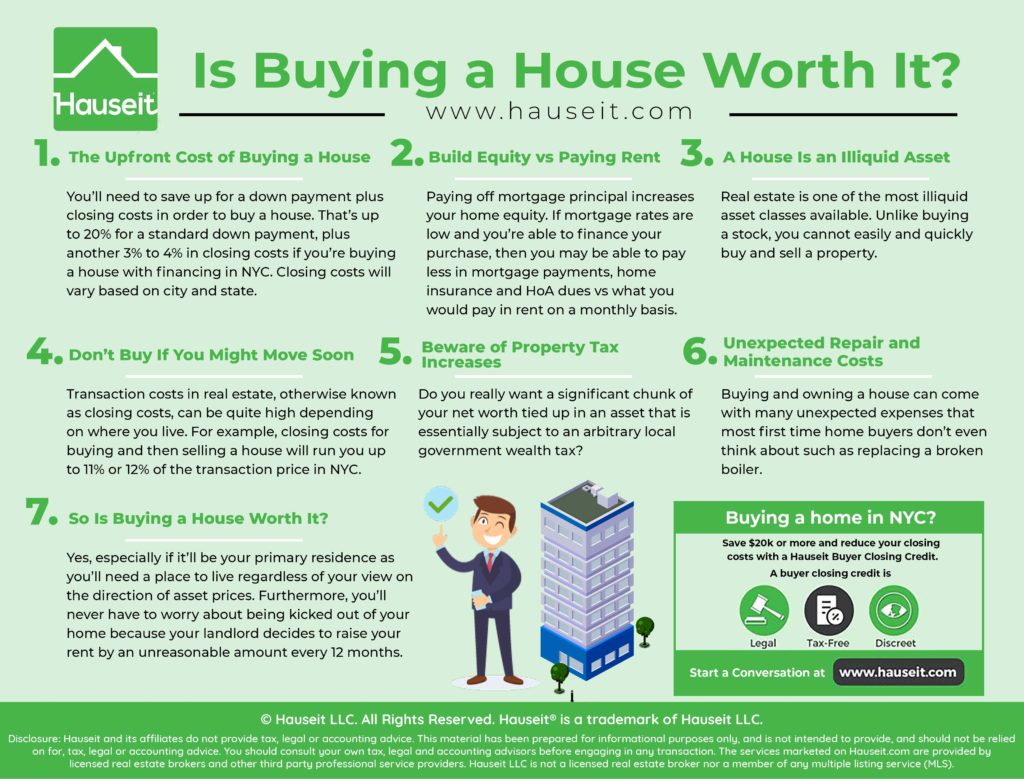Buying a house is worth it if you have enough savings for a down payment plus closing costs, and rates are low enough such that your all in housing expenses are roughly the same or less than what you’re paying in rent every month.
You’ll need to save up for a down payment and closing costs in order to buy a house.
In fact, you’ll generally need to save up to 20% for a standard down payment, plus another 3% to 4% in closing costs if you’re buying a house with financing in NYC.
Closing costs will vary based on which city and even which state you are buying in.
In our example of buying a house in NYC, you’ll need to save a whopping 23% to 24% of the purchase price and pay this upfront just to cover the down payment and closing costs.
This doesn’t include the ongoing payments you’ll have to make towards mortgage principal and interest, home insurance premiums, home owner association (HoA) dues and any repair or maintenance costs.
Our Discretion, Your Advantage
Our traditional partner brokers never openly discount which means less disruption and better execution for you.
If mortgage rates are low and you’re able to finance your purchase, then you may be lucky enough to be able to pay less in mortgage payments, home insurance and HoA dues vs what you would pay in rent on a monthly basis.
If this is the case, or even if the payments are roughly equal in nature, then buying vs renting is typically a no brainer. That’s because your mortgage payments consist of both principal and interest payments. While interest payments go to the bank, your principal payment reduces your mortgage principal and thus the amount of money you owe on your house. When you reduce the money you owe on your house, you own a greater share of the equity value of the house.
For example, let’s assume your home can sell for $1,000,000 and you have an $800,000 mortgage. This means if you were to sell it today, you’d net yourself $200,000 in equity value, assuming no closing costs in a perfect world.
However, if in 10 years you’ve paid down your mortgage to $500,000 and you sell it for $1,000,000 then you’d net $500,000, excluding closing costs in our perfect world. As you can see, all those mortgage payments you made over the years really went to yourself, because you decreased debt and as a result increased equity in your home.
Save 2% On Your Home Purchase
Save thousands on your home purchase with a buyer agent commission rebate from Hauseit
Keep in mind that real estate is one of the most illiquid asset classes available. Unlike buying a stock, you cannot easily and quickly buy and sell a property.
As an example, the average days on the market to a signed contract in NYC as of this writing is over 100 days. That means it takes over three months just to lock down a buyer, and this doesn’t account for the additional 30 to 90 days it’ll take from contract signing to closing.
Furthermore, it is by no means guaranteed that you will be able to find a property to buy or to find a buyer for your property at a mutually acceptable price.
Unlike in the stock market, there are no market makers who will readily offer you a bid/ask spread on your home.
Sure, there are many startups and other all cash investors offering to buy your house fast with all cash offers. But these are generally known to be scams as the offers are typically well below market value, often with discounts of 50% or more.
So is buying a house worth it if you might not be able to sell it? Sure, it still can be because all investments have some risk of illiquidity, though the risk may be more pronounced for real estate. Plus, people always need a place to live, including yourself!
Transaction costs in real estate, otherwise known as closing costs, can be quite high depending on the state that you live in. Is buying a house worth it if there’s a strong possibility that you might have a job change and have to move in a few years? Probably not, because as we discussed closing costs will likely eat up most of your gains, if any, if you buy and then sell so soon.
Though closing costs will vary depending on which state you’re in, and even which county and city you’re in within that same state, you can generally assume that closing costs for buying and then selling a house will run you up to 11% or 12% of the transaction price.
This is quite significant, and does not account for any capital gains taxes you might have to pay if your home has appreciated significantly in value. Of course, if the home you are selling is your primary residence, there are some tax benefits you can take advantage of which can mitigate some of those potential capital gains taxes. Read our guide on NYC real estate taxes to learn more.
A Full Service Listing for 1%
Sell your home with a traditional full service listing for just one percent commission.
Do you really want a significant chunk of your net worth tied up in an asset that is essentially subject to an arbitrary local government wealth tax?
Keep in mind that even if you move and don’t live in your house anymore, you’ll still have to pay property taxes to your local city or county government.
This is especially scary if you live in a high tax, high spend state that doesn’t know how to balance its budget. This kind of tax and spend state might be held captive by special interests who benefit from its generous spending, and as a result won’t be able to easily reduce spending.
As a result, sometimes the only way for these profligate state and local governments to avoid bankruptcy is to continuously increase taxes of all kinds, such as property taxes, sales taxes and income taxes.

Is buying a house worth it if the local government cannot control its spending? Then probably not, because even if you move and rent out your property, your house will still be subject to uncontrollable increases in property taxes.
And remember, as property taxes increase, the property becomes less valuable to potential buyers, and therefore your asset will decrease in value as well.
Buying and owning a house can come with many unexpected expenses that most first time home buyers don’t even think about. For example, who do you think is going to pay $10,000 to replace or repair that boiler that breaks a year from now? Or what if your roof starts leaking during the middle of the winter next year? Who is going to pay for emergency repairs?
Furthermore, there are maintenance costs associated with owning a house. If you aren’t a handyman or simply don’t have time to learn and do certain tasks around the house, then you’ll have to pay someone else to do it. This can range from changing the light bulb, mowing the lawn, painting the walls to repairing cabinet shelves.
Our Discretion, Your Advantage
Our traditional partner brokers never openly discount which means less disruption and better execution for you.
Yes, especially if it’ll be your primary residence as you’ll need a place to live regardless of your view on the direction of asset prices. Furthermore, you’ll never have to worry about being kicked out of your home because your landlord decides to raise your rent by an unreasonable amount every 12 months.
Therefore, if you intend on buying a house for your permanent residence, and you genuinely will enjoy living in the house, then yes we think it’s almost always worth it. If you intend to live in the property for decades and have no plans to move, then it’s likely that your property will be worth more decades from now. This is generally the case for stock markets and the real estate market, at least in the United States over the long run.
Furthermore, even if you purchase your home when rates are high, you always have the ability to refinance your mortgage when rates become lower again.
Save 2% On Your Home Purchase
Save thousands on your home purchase with a buyer agent commission rebate from Hauseit
Disclosure: Hauseit® and its affiliates do not provide tax, legal, financial or accounting advice. This material has been prepared for informational purposes only, and is not intended to provide, and should not be relied on for, tax, legal, financial or accounting advice. No representation, guarantee or warranty of any kind is made regarding the completeness or accuracy of information provided.






